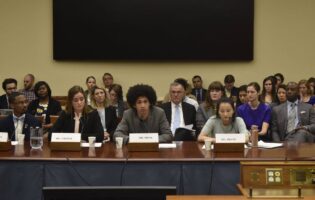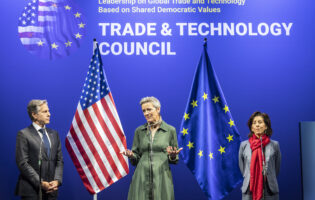Rethinking Trust: U.S.-German Relations Beyond the NSA Affair

Eva Jobs
University of Marburg
Eva Jobs is a PhD candidate at the University of Marburg. In her dissertation she addresses the role of trust in the transatlantic intelligence cooperation. Most recently she has worked for the German Military History Museum in Dresden. Prior to that, she held positions as Visiting Scholar at UNC, Chapel Hill, Research Fellow at the American Institute for Contemporary German Studies (AICGS) and served as an advisor for public history media. Ms. Jobs holds a Master’s degree from Philipps University, Marburg. In 2011/12 she was a research assistant for the Independent Research Commission for the History of the German Intelligence Service (BND) in Berlin and Washington, DC.
She is a 2016-2017 participant in AICGS’ project “A German-American Dialogue of the Next Generation: Global Responsibility, Joint Engagement,” sponsored by the Transatlantik-Programm der Bundesrepublik Deutschland aus Mitteln des European Recovery Program (ERP) des Bundesministeriums für Wirtschaft und Energie (BMWi).
In political rhetoric, trust is a powerful trope.[1] Various speeches, policy papers, and internal notes use the term trust and emphasize its crucial meaning for bilateral partnerships. The benefits of mutual trust, resulting in not only bureaucratic facilitation, but also personal relations, seem apparent and were an undeniable part of building a relationship between the U.S. and West Germany after World War II. Besides politics, commerce, and academia, intelligence organizations also established ties to the former enemy. One remarkable transatlantic joint venture started in May 1945, when Wehrmacht General Reinhard Gehlen and his inner staff from “Foreign Armies East” turned themselves in and handed over much needed information about Eastern Europe to the U.S. Army. It was a striking example of the fragile and delicate imperative for trust and a serious security hazard at the same time. By establishing cooperation with Gehlen, U.S. military intelligence set the cornerstone both for a close intelligence liaison and for the future German Foreign Intelligence Service (Bundesnachrichtendienst). But along with the popular saying “there are friendly countries, but no friendly intelligence services,”[2] trust was given a pragmatic rather than a moral connotation: the leap of faith on the part of the Counter Intelligence Corps (CIC) and the CIA did not result from goodwill but from strategic calculations, i.e., fear of the USSR exceeded the bias associated with Germany and its past. The German intelligence community (IC) members soon created their own clandestine sphere of action. Given the sometimes dramatic ups and downs in U.S.-German intelligence relationships,[3] the level of collaboration remained surprisingly high. Yet, the most recent challenges, especially since they are publicly carried out, seem to have affected things more than many in Washington, Fort Meade, or Langley imagined.[4]
A lot has been written about the enormous public outcry in Germany and the backlash in the U.S. since Edward Snowden’s first revelations on NSA eavesdropping and mass surveillance practices in May 2013. Things seem to have cooled down a little, but are ready to come to a boil again over the next incident. Although it was an intelligence-related affair that got the ball rolling (and few Germans are familiar with this aspect of foreign and security policy), this went far beyond an intelligence liaison issue to become a serious political problem. The very fact that there is almost no debate including Britain’s Government Communications Headquarters (GCHQ) practices, and that other European countries seem to have overcome the revelations, strikes one as a particular German-American rift.[5] Without being too pessimistic, it might be a symptom of a declining transatlantic relationship developing ever since the end of the Cold War and the rise of the European Union. The fading glue of a mutual adversary and increasingly easy opportunities to travel, work, and study[6] within Europe have revealed a paradigm shift here. The United States’ focus turns more toward Asia and other world regions while Germany mostly engages in European affairs, de-emphasizing the common ground with Washington. The nearly complete pull-out of U.S. Armed Forces, decreasing numbers of German high school exchange students,[7] and budget cuts for several transatlantic programs[8] indicate the decline. Essays and articles also back the assumption that the United States is about to lose its appeal as a “Sehnsuchtsort” or place of longing for many young Europeans and, in particular, for Germans,[9] who are critical not only of domestic problems (including financial and social crises, racial discrimination, political extremism), but especially the foreign policy in the post 9/11 era (Iraq war, Guantanamo, use of torture).
And yet, the implementation of intelligence represents one of the crucial points. So the German anger is not only about overall privacy objections, but also pointed at what many perceive as arrogance and an imperialistic U.S. foreign policy explicitly against their faithful ally.
The Historical Experience and the Strengthening of the Transatlantic Relationship
We obviously face different perspectives regarding the balance of freedom and privacy versus security. Europeans in general and Germans in particular set different standards concerning privacy rights: they consider most aspects of their lives private and expect their government to respect that. Many Americans seem to have other priorities, and their claims to privacy apply more to their homes and their area of action outside the work and public sphere.[10] The historical argument that emphasizes the German experience with both National Socialist and later Stasi intelligence appears very plausible. And the list of negative experiences and bad press goes on: be it the disclosure of former Nazis employed by the Federal Intelligence Service (BND)[11] and American agencies[12] or the failure of the domestic services (Bundesamt für Verfassungsschutz, BfV and Landesämter für Verfassungsschutz, LfV) on the right-wing terror organization National Socialist Underground (NSU) case. Yet, while detailed knowledge remains scarce, this lack of serious interest provides a breeding ground for conspiracy theories and outright skepticism. Altogether, the whole business of intelligence gathering is not debated as an integral part of politics and decision-making. The German public is used to perceiving intelligence at large as potentially dangerous, shady, or even criminal, as well as incompetent.
American citizens, who are also disturbed by some of Snowden’s revelations, faced intelligence failures, too, but never experienced a secret police apparatus or the abuse of power aimed at virtually the entire population.[13] Aside from targeted individuals within the U.S. (e.g., during the Vietnam War), it was mainly foreign intelligence that failed publicly or caused scandals.[14] Furthermore, the excesses of Cold War intelligence and covert action against South and Central American countries (among others), led to establishing oversight committees[15] as early as 1975 and to public hearings from high-ranking IC members. Furthermore, a positive connotation in fiction and public image leads to a more ambivalent mindset. So, on one side, we have a history of a negative record and, at least to some extent, ignorance toward the work of intelligence services. On the other side of the Atlantic, there is a society that is much more pragmatic about intelligence and that saw an acceptably efficient system of accountability in place. It is also traumatized and terrified, and Germans must not underestimate the continuing impact of the 9/11 events.
Neither side is more right than the other, although German concerns should be taken seriously. Being careless, bugged, or willing to sacrifice basic civil rights too easily in fear should not serve as the motivation to wipe away the German (over-)reaction. On the other hand, there has to be a German discussion about the obvious and legitimate need for intelligence in an age of global terrorism and new geopolitical crises. Ignoring the remaining dependency on American intelligence does not help either. Unfortunately, it has come down to sentiment and an overemphasis of cultural difference, with a German public that panics and seems to ignore terror threats and economic necessities and some Americans with a bold “stop whining, we have bigger fish to fry” attitude. This is clearly a tough matter to address, as it impacts many different levels of exchange, including the Transatlantic Trade and Investment Partnership (TTIP) negotiations, and impedes transatlantic bonds. There is an urgent need for adept and credible ambassadors in both countries to increase mutual understanding.[16]
Besides very legitimate concern about the legal as well as moral purpose and limits of intelligence in Germany, the dimension of outrage is likely to have served two further functions. First, on the political level, the government’s outspoken indignation[17] distracted many for quite a while from scrutinizing its own role and responsibilities. Political leadership was either negligent and sloppy, or deliberately concealing its longtime involvement. More evidence is hinting toward the latter, but either case would be extremely unflattering and none of it comforting. The overhasty and specious demand for a “No Spy” agreement or a “Five Eyes”-like relationship was on the table for months—though being both unconstitutional and unrealistic, it should not have been proposed at all. Again, there was either no idea of or no qualms over taking advantage of the general confusion.
Securing the Internet and Solving Problems on the Policymaker Level
On both sides of the Atlantic, we observe a growing skepticism regarding security in cyberspace. However, we keep relocating vast parts of our communication, work, finance and trade, administrative, and organizing issues to the digital world. No one would question the immense importance of data flows for the global economy[18] or revoke digital facilitation. At the same time, our trust in companies and governments to secure the means for using cyberspace declines. Increasing concern regarding trends toward cyber-Balkanization or the rise of a splinternet are likely to change the rules and put freedom and reliability at risk.[19]
But since the NSA affair broke, we see threats beyond criminal phishing accounts, stolen credit card data, or shady foreign regimes stealing intellectual property or even conducting cyber-attacks.[20] Our own governments and allies seem to monitor, collect, and control our personal data and meta data, putting their citizens under general suspicion. Again, it seems to be a “trust but verify” situation, but on a much larger scale. Chancellor Angela Merkel’s cell phone appears to have drawn the greatest attention in the United States, but for most Germans it was the “every day and everyone” dimension that was the actual scandal. Public opinion claimed that Merkel should just have used her crypto-phone.
So here is a slightly provoking thought: maybe, the fundamentally crucial point is not whether the NSA should be allowed to wiretap innocent citizens and conduct mass surveillance; maybe we should stop considering the internet/cyberspace a privacy-providing sphere and instead concentrate on fighting for protection against organized crime and terrorism. In this context, privacy refers to, private communication and not sensitive social security data or online banking, for example. If we do not come to terms on reasonable duties and limits of intelligence and intelligence cooperation or focus on providing a safe digital environment, then we risk losing the internet as one of the greatest technologies of our times. Even companies fear the backlash of state-run practices, losing consumers’ trust and being confronted with serious financial damage. To ease the crisis, to maintain sound intelligence liaison, and to re-establish friendly political relations, a collaboration between policymakers, intelligence analysts, legal experts, and the private sector on both the national and bilateral levels could make a contribution.
Education and Accountability
Democracies in the twenty-first century face new challenges and threats and need to adopt and exploit the new technical and digital tools. This last part addresses the link between the public and the political sphere, especially in Germany. There clearly is a completely different relationship in the U.S. than in Germany, where a significant majority considers their government a trustworthy institution, acting on their behalf (most of the time). In the turmoil over the NSA affair, many Germans disapproved of the grand coalition’s handling of the crisis. German media, in their initially poorly written and incorrect articles, fueled the debate, mixing political dissatisfaction with legitimate accusations. Germans showed their naiveté in the level of ignorance toward the work and existence of intelligence agencies. The resulting tension between the public and the government has eased a little over time, but many citizens are resigned and disappointed. To individuals working on the subject, it is almost embarrassing how little was publicly known and discussed before Edward Snowden made his revelations.
Two tools might help concerned citizens, essentially Germans, to come to a more reasonable, pragmatic dealing with intelligence: the first instrument is media literacy. It is fairly simple to use smart-phones, to engage in social media, and to shop online, but learning how to critically operate in cyberspace takes more than that. We will need better education in this regard, raising awareness for sharing information on the internet with companies, governments, and other actors, so that we are able to credibly claim accountability where it is needed. Taking responsibility for voluntarily-provided content, and a conscious usage of social media platforms, for example, is among those things that even digital natives should do. The private sector in particular could be motivated to engage in educational programs in order to restore trust in their products.
The second instrument, as crucial as the first, is legal or state-run accountability and the importance of oversight. The responsible committees, the Select Committee on Intelligence (SSCI) and the House Permanent Select Committee on Intelligence (HPSCI), successors of the Church and the Pike Committees, are in place in the U.S., and there is an equivalent in Germany, but a general impression is that their expertise and competence could and should be improved. There seems to be not enough emphasis on or reputation for that task. Still, intelligence agencies have a duty to serve their governments and the people they represent; they cannot afford to lose trust and respect for their work. Being perceived as self-serving institutions with non-transparent goals is not in their best interest, either—even if they are not directly dependent on public approval and somehow used to being ignored or criticized.
Obviously, the distinct necessity of keeping some secrets from the public and the culture of secrecy create a tension about limits and legitimacy. In Germany especially we observe a “state within a state” (“Staat im Staate”) mentality that again fuels suspicion and fear. By learning from the American model to create a more permeable structure between the spheres of academia and intelligence, for instance, there is a chance to enhance acceptance and appreciation on both sides in the long run.[21] Additionally, the German government, as the consumer and the institution in charge, urgently needs to address the public in order to relieve pressure on the transatlantic relationship and to not lose further credibility with the voters. The very fact that German intelligence is conducting espionage against allies like its NATO partner, Turkey, should hint to the nature of the business and the quite consensual practices. Besides an overdue domestic approach within Germany, Americans are well-advised to acknowledge the resentment and deep disappointment the NSA affair sparked, but there is a difference between the origins of these feelings and the specific circumstances that led to the current crisis. To many, Snowden’s revelations have brutally disclosed some unpleasant realities about aspects of U.S.-German “trust” relations, ignoring that the imposed expectations were impossible to comply with on a state-to-state level.
Rather than mourning betrayed confidence, we should regard trust as a foreign policy tool: it expresses the willingness to cooperate, a focus on shared values, and a similar perception of challenges. It enables decision-makers and citizens to constructively discuss differing opinions and treat one another with respect. Trust, in the moral sense that has been used in recent debates, should rather be reserved for interpersonal relations and not assume an emotionally-charged meaning in foreign affairs.
Eva Jobs was a DAAD/AGI Research Fellow in November-December 2014 and is a PhD candidate at the University of Marburg.
[1] See: Niklas Luhmann, Vertrauen: Ein Mechanismus der Reduktion sozialer Komplexität (Stuttgart: UTB, 2000 [1968]); Martin Hartmann, Claus Offe, ed., Vertrauen. Die Grundlage des sozialen Zusammenhalts (Frankfurt / New York: Campus, 2001); for mistrust see: Deborah Welch Larson, Anatomy of Mistrust: U.S.-Soviet Relations during the Cold War (New York, NY: Cornell University Press, 2000).
[2] James M. Olson, “The Ten Commandments of Counterintelligence,” Studies in Intelligence, no. 11 (Fall-Winter 2001), https://www.cia.gov/library/center-for-the-study-of-intelligence/kent-csi/vol45no5/html/v45i5a08p.htm (9 December 2014).
[3] See for example the infamous “Felfe affair“ in 1961.
[4] Some even appraise the crisis on the same level as the differences over the Iraq War: Emily Sieg, “The Transatlantic Community and the Role of Trust,” Bucerius/BMW Foundation Brief, 16 October 2014, 2014-2015 Transatlantic Governance Project, p. 5.
[5] On the legitimacy of U.S. espionage activities and German disappointment, see: Peter Rudolf, “Vertrauen wär’ gut … doch Amerika will Kontrolle: Zur Legitimität von Spionage,” Internationale Politik 6, November/December 2014, p. 26-33.
[6] On the impact of the “Erasmus” program in this regard, see: Christina Tsafoulias, “Exchange Programs and Transatlantic Relations,” DGAP Transatlantic Paper, Nov. 2014, p. 10, https://dgap.org/en/article/getFullPDF/26170
[7] See: http://www.weltweiser.de/grafik/Statistik/2014/Gastlaender_alle.gif
[8] See: Christina Tsafoulias, “Exchange Programs and Transatlantic Relations,” DGAP Transatlantic Paper, Nov. 2014, https://dgap.org/en/article/getFullPDF/26170
[9] Stephan Richter, “Lagebericht in 45 Punkten: Amerika, du hast es schlechter,” Frankfurter Allgemeine Zeitung on the web, 29 November 2014, http://www.faz.net/aktuell/feuilleton/lagebericht-in-45-punkten-amerika-13290374.html (4 December 2014).
[10] Yet there is engrained reluctance toward the federal government’s collection of data in the U.S.; the absence of an electoral register or a centralized registry illustrates that.
[11] Just recently it was hitting the news that Alois Brunner seems to have had close ties in that regard, see: Oliver Das Gupta, “Deutscher Agent bestätigt Tod von SS-Verbrecher in Syrien,” Süddeutsche Zeitung on the web, 1 December 2014, http://www.sueddeutsche.de/politik/nazi-scherge-alois-brunner-deutscher-agent-bestaetigt-tod-von-ss-verbrecher-in-syrien-1.2247250 (2 December 2014).
[12] For example, see: Richard Breitman et al. U.S. Intelligence and the Nazis (New York, NY: Cambridge University Press, 2005); especially Section III, pp. 265-442.
[13] Although McCarthyism almost approximates the criteria; e.g., see: David K. Johnson, The Lavender Scare (Chicago: University of Chicago Press, 2004).
[14] Most recently, the CIA faces widespread criticism due to the torture report: Jeremy Ashkenas et al., “7 Key Points from the C.I.A. Torture Report,” The New York Times on the web, 9 December 2014, http://www.nytimes.com/interactive/2014/12/09/world/cia-torture-report-key-points.html (9 December 2014).
[15] Church and Pike committees for Senate and House
[16] Parke Nicholson, “Getting Over the NSA”, Baltimore Sun, 21 November 2014.
[17] “Über so viel Dummheit kann man nur weinen,” Frankfurter Allgemeine Zeitung on the web, 9 July 2014, http://www.faz.net/aktuell/schaeuble-wirft-usa-in-spionageaffaere-dummheit-vor-13037532.html (8 December 2014); “Ausspähen unter Freunden – das geht gar nicht,” SPIEGEL online, 24 October 2013, http://www.spiegel.de/politik/deutschland/handy-spaehaffaere-um-merkel-regierung-ueberprueft-alle-nsa-erklaerungen-a-929843.html (8 December 2014).
[18] For the significance of cross-border data transfers and data flows and, see: Axel Spies, “German/U.S. Data Transfers. Crucial for both Economies, Difficult to Regain Trust,” AGI Issue Brief no. 46 (Washington, DC: The American-German Institute, April 2014); Joshua P. Meltzer, “The Importance of the Internet and Transatlantic Data Flows for the U.S. and the EU Trade and Investment,” Brookings Global Economy and Development Working Paper 79, October 2014.
[19] “The future of the internet: A virtual counter revolution,” The Economist, 2 September 2010, sec. Briefing; a fairly critical evaluation about the private sector’s influence, based on documents obtained by Snowden: John Naughton, “Edward Snowden’s not the story. The fate of the internet is,” The Guardian on the web, 27 July 2013, http://www.theguardian.com/technology/2013/jul/28/edward-snowden-death-of-internet (8 December 2014).
[20] For a very comprehensible account of threats and countermeasure in cyberspace, see: P.W. Singer and Allan Friedman, Cybersecurity and Cyberwar. What everyone needs to know (New York, NY: Oxford University Press, 2014).
[21] In the U.S. not only do various degree programs exist (“Intelligence Studies“), but they also incorporate former intelligence officers as lecturers or professors. In Germany, however, there is not a single center or department dealing explicitly with intelligence matters, let alone that include IC professionals.








